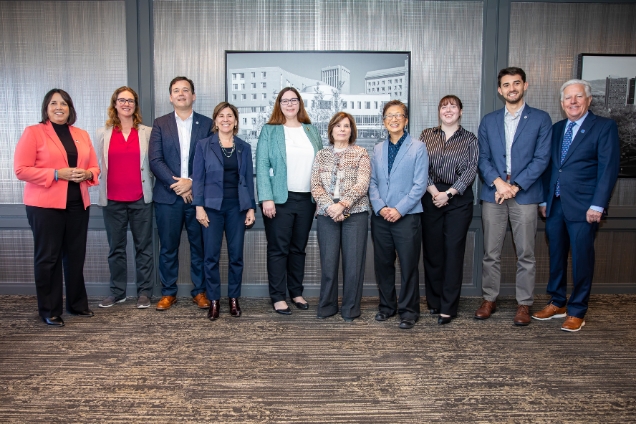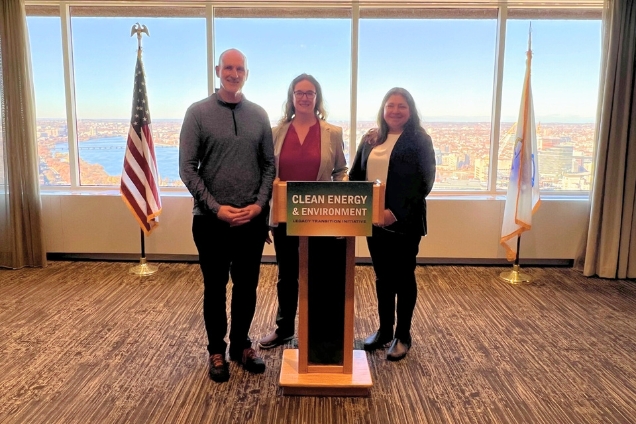IGS Partners with Healey-Driscoll Administration and UMass Lowell to Advance Equitable Clean Energy in Massachusetts
The Healey-Driscoll Administration, UMass Lowell, and Boston University have launched the Clean Energy and Environment Legacy Transition (CELT) Initiative, a new international partnership to advance an equitable energy transition in Massachusetts, empower communities, and train the next generation of climate leaders. The effort is backed by $5.7 million in funding from the Department of Energy Resources. It comes on the heels of Massachusetts passing major climate and clean energy legislation last week, demonstrating the state’s significant investment in sustainability innovation and transformation.
Massachusetts Lieutenant Governor Kim Driscoll underscored the power of partnerships for CELT in bringing together the state’s sustainability and education leaders across academia, industry, and government. CELT also includes research collaborations with Irish universities, stemming from a 2023 trade mission to advance sustainability.
“This Initiative is a big step toward making our state’s clean energy and climate solutions more equitable,” Lieutenant Governor Driscoll said at the CELT launch event. “We’re going to tap into expertise at our exceptional universities, and use that innovative sphere with our industry partners, to make sure everyone in our community benefits from a sustainable future.”
The Lieutenant Governor was joined in making remarks by Secretary of Energy and Environmental Affairs Rebecca Tepper, Massachusetts Department of Energy Resources Commissioner Elizabeth Mahony, BU Provost and Chief Academic Officer Gloria Waters, UMass President Marty Meehan, and UMass Lowell Chancellor Julie Chen.

CELT has several key objectives to further the state’s leadership in tackling the climate crisis. It puts equity at the forefront of decarbonization efforts to ensure local energy transitions benefit from the wealth of technical assistance and expertise available through the powerhouse of academic knowledge in Massachusetts. CELT will also champion geothermal energy projects as part of the state’s clean energy future, partnering with universities, industries, and communities. To do this, the Initiative will help develop a diverse workforce with the specialized skills to facilitate implementation and boost support to pursue state funding opportunities for these projects.
BU’s Institute for Global Sustainability (IGS) will lead data analysis for CELT, building on the University’s global leadership in data science to address some of society’s most pressing challenges. BU also boasts Boston’s largest fossil fuel-free building, a 19-story feat of geothermal energy’s potential that is home to its Center for Computing & Data Sciences.
BU’s data analysis work will be led by three IGS Associate Directors: Principal Investigator and Associate Professor Emily Ryan (College of Engineering), Professor Cutler Cleveland (College of Arts & Sciences), and Associate Professor Patricia Fabian (School of Public Health).

“We are excited to work with the state to advance their goals around clean energy transitions,” Ryan said. “BU is a leader in data science, and this new partnership with the state gives us a great opportunity to apply our research and help our community move towards a more sustainable future.”
To kickstart this Initiative over the next three years, BU students and faculty will play a key role in the state’s on-the-ground energy transformation. They will work directly with municipalities and community leaders to offer technical assistance in leveraging vital data for decision-making and investments. This information will ensure the clean energy transition is inclusive and benefits everyone, guiding decisions such as where to locate energy infrastructure and which communities need the most support.
The IGS-led team will draw on its strength in visualizing complex data to make it more accessible, which is grounded in its science communication work through Visualizing Energy, an IGS project connecting energy transitions and human wellbeing. IGS also prioritizes equity and justice in its energy transitions research. This includes a first-of-its-kind database to identify energy infrastructure exposure hotspots across the US, work on energy and justice in US offshore wind development funded by the Department of Energy, and research on justice in renewable energy supply chains. Building on this approach for CELT, IGS’s efforts will complement the state’s current Environmental Justice endeavors.
The catalyst for CELT was Governor Maura Healey’s first international trade mission to Ireland in June 2023, joined by BU Provost and Chief Academic Officer Gloria Waters.
“CELT further attests to Massachusetts’ leadership on climate and clean energy, and Boston University is proud to bring our expertise in sustainability and data science to this research collaboration with the Healey-Driscoll Administration and UMass Lowell,” Waters said in the state’s announcement.
CELT will also support graduate student fellows conducting policy and data analysis for the state and clean energy planning and project implementation for municipalities.
“I think the idea of having our students working hand in hand with communities, and also with government partners, is really going to be an amazing opportunity for them and help us create new generations of young people who are interested in sustainability and being leaders in this field,” Waters said at the launch event.